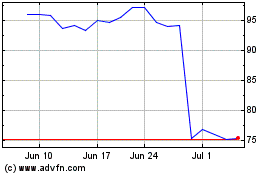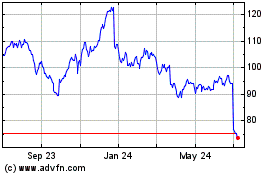Nike Track Coach Alberto Salazar Gets New Suspension from U.S. Center for SafeSport
February 01 2020 - 2:33PM
Dow Jones News
By Rachel Bachman
Famed Nike track coach Alberto Salazar, already banned from the
sport for doping violations, on Friday was temporarily suspended by
the U.S. Center for SafeSport pending an investigation of
allegations of misconduct, according to the center's centralized
disciplinary database.
The exact nature of the allegations couldn't be determined.
Neither Salazar nor SafeSport immediately replied to requests for
comment.
USA Track & Field, the sport's governing body, didn't
immediately respond to a request for comment.
SafeSport implements temporary measures when the center believes
they are necessary to protect sport community or athletes,
according to information on its website.
In September, Salazar was handed a four-year ban by the U.S.
Anti-Doping Agency for orchestrating and facilitating prohibited
doping conduct. He is appealing the decision. Salazar oversaw the
elite running team the Nike Oregon Project until Nike disbanded it
shortly after the suspension.
In the wake of Salazar's doping suspension, several women who
ran for the Nike Oregon Project said coaches pressured them to lose
weight, sometimes with harmful health consequences, and publicly
shamed them about it.
Amy Yoder Begley, a former middle-distance runner with the
group, tweeted that she was told she was too fat and "had the
biggest butt on the starting line."
Mary Cain, a young prodigy who trained under Salazar, said in a
New York Times video in November that she had been "emotionally and
physically abused" by a system designed by Salazar. She said she
was pressured to lose weight and stopped menstruating for three
years.
In previous statements, Salazar has said he had frank
discussions with male and female runners about the impact of weight
on performance, but disputed that he encouraged female athletes to
maintain an unhealthy weight, and denied that any athlete suffered
abuse or gender discrimination while running for the Oregon
Project.
While SafeSport is best known for investigating allegations of
sexual harassment and abuse, athletes including Cain increasingly
have spoken about the need to police other harmful forms of
behavior, particularly in coaching.
Cain told Sports Illustrated in November that it was
"unfortunate that we can seemingly only take full action in terms
of banning people when it comes to doping violations. And of course
programs like SafeSport have created more of a platform to enforce
abuses in sports and make sure young athletes are in a more
appropriate environment.
"But the truth is, until my story broke, I didn't even know that
they were a platform that I could go to outside of sexual abuses.
So anything that was emotional or psychological, I've since started
to get in contact and get the ball rolling. But I think it's
important to kind of enforce the knowledge that there can be action
taken even when it's not almost as egregious as sexual abuse and/or
doping incidents."
Cain couldn't be reached for comment.
Write to Rachel Bachman at rachel.bachman@wsj.com
(END) Dow Jones Newswires
February 01, 2020 14:18 ET (19:18 GMT)
Copyright (c) 2020 Dow Jones & Company, Inc.
Nike (NYSE:NKE)
Historical Stock Chart
From Mar 2024 to Apr 2024

Nike (NYSE:NKE)
Historical Stock Chart
From Apr 2023 to Apr 2024
